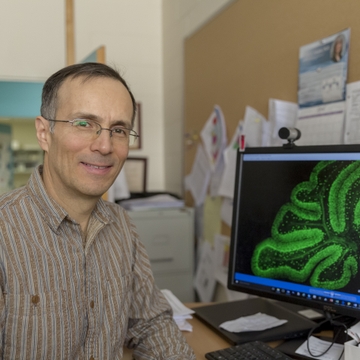New Mexico Approves Master of Science in Anesthesia Program at UNM

One Drink is Too Many
Fetal Alcohol Spectrum Disorder Awareness Day Highlights Risk to Unborn Child
You've probably heard that having a few alcoholic drinks while pregnant won't harm the baby - you could have heard it from your parents, your friends or even a doctor. This is an all-too-common notion that researchers participating in Fetal Alcohol Spectrum Disorders (FASD) Awareness Month are hoping to eliminate.
The New Mexico Alcohol Research Center (NMARC) at the UNM Health Sciences Center recently observed FASD Awareness Day with a seminar from an invited speaker as well as a poster session to highlight the work being done at NMARC.
"The challenge is that, even though the current estimate for FASD is somewhere between 2 and 5 percent in this country, almost no one realizes or believes that this is a problem," said NMARC director Daniel Savage, PhD.
Since 1999, institutions across the globe have held International FASD Awareness Day events on the ninth day of the ninth month of the year - to symbolize the nine months of pregnancy. The goal is to inform the public as well as health care providers, educators and other advocates about the cost of drinking during pregnancy.
This is especially important in a state like New Mexico, which has some of the highest levels of alcohol-related deaths in the country. "Part of the need for this awareness day is to try to heighten people's understanding and awareness that this is a real clinical challenge and a public health issue," explained Savage, UNM Regents' Professor and chair of the Department of Neurosciences.
The National Institute on Alcohol Abuse and Alcoholism estimates that 20 to 30 percent of women consume alcohol during pregnancy and cautions that even small amounts of alcohol can lead to severe consequences for the fetus. This includes FASD, a type of fetal brain damage induced by prenatal alcohol exposure.
This encompasses a variety of symptoms including facial and growth abnormalities, deficits in learning and memory, impaired attention and more.
"What is a little bit different in (FASD) than other neurodevelopmental disorders is that, unfortunately, there's a stigma attached that's spread all around," Savage said. Mothers are often blamed for their child's condition, which comes with its own trauma for the child, he said.
This blame often comes from those who should be supporting for the mother and child, including doctors, lawyers and social workers.
Additionally, not all children with FASD can be easily identified, according to Savage. Many FASD patients lack the trademark facial abnormalities and are often overlooked for specialized care because of it.
During his seminar, invited speaker Craig D.C. Bailey, PhD, said that out of 100 live births, two to five of those babies might be expected to have FASD.
Bailey, an assistant professor in the Department of Biomedical Sciences at the University of Guelph, studies the cellular and developmental implications of alcohol exposure during pregnancy using the brains of mice. He hopes that his research may one day contribute to interventions for fetuses who have been exposed to alcohol before they are born.
One of the unique challenges for clinicians is that treating the symptoms of patients with FASD is difficult.
"There are no medications right now that have shown any efficacy in helping these children with any aspect of the myriad of problems that they encounter," Savage said.
On the other hand, Savage and the other scientists at NMARC remain hopeful that someone will find an answer in their research. "I'm excited that (my work) raises more questions to study," Bailey said.
A collaborative air pervaded the entire day, starting with the lively Q&A following Bailey's presentation. NMARC researchers asked Bailey about his research methods and discussed how to approach future studies within their field.
Dina Hill, PhD, a clinical psychologist at the FASD Clinic in the UNM Center for Development and Disability, was enjoying the unified feeling of the event. "Just hearing the other perspectives is so helpful on the clinical side of things," she said.
Hill, an associate professor in the Department of Psychiatry & Behavioral Sciences, appreciated that lab-based researchers can help give her a roadmap of the latest discoveries in the field, as well as what problems may arise and how to intervene with the young patients that she sees.
"We just can't pinpoint some of the deficits in quite the same way as they can do in some of the pre-clinical trials," Hill said. "To get to what is the basic neurological deficit that (the patients) are coming into the world with and then have to deal with all these extra things on top of it - I can't separate that out in the clinical populations. So, this is really helpful that way."
NMARC scientists and clinicians hope that FASD Awareness Day will engage New Mexicans enough to convey one simple truth: no amount of alcohol consumed while pregnant is acceptable.
"There is no safe level," said C. Fernando Valenzuela, MD, PhD, NMARC's associate director and professor in the Department of Neurosciences. "Avoid it if you can."